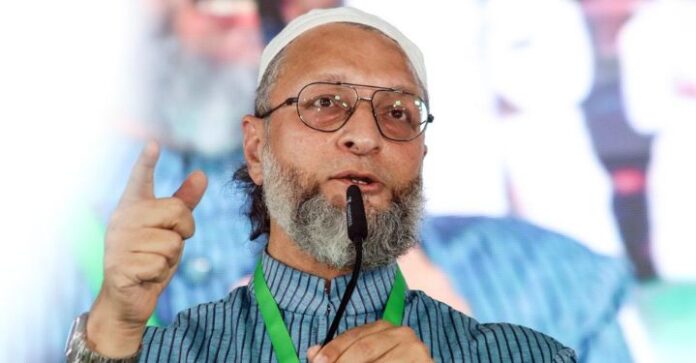The geopolitical discourse between India and Pakistan has once again taken a sharp and emotional turn, with All India Majlis-e-Ittehadul Muslimeen (AIMIM) leader Asaduddin Owaisi strongly rebuking Pakistani politician Bilawal Bhutto Zardari’s aggressive remarks over the Indus River dispute. Owaisi’s response, referencing the assassination of Bilawal’s mother, former Prime Minister Benazir Bhutto, aimed to remind the young leader of the internal threats Pakistan faces, rather than encouraging belligerence toward India.
The Trigger: A Provocative Declaration
In a fiery speech delivered in Sukkur, Sindh, Bilawal Bhutto Zardari declared that the Indus River is Pakistan’s rightful property and would remain so. He escalated his rhetoric by saying: “Either the water flows to Pakistan, or the blood of those trying to steal it will.” This bold and provocative assertion came in the wake of India’s decision to suspend the implementation of the Indus Waters Treaty following the Pahalgam terrorist attack in Jammu and Kashmir.
The Treaty, signed in 1960 and brokered by the World Bank, has long stood as a rare point of cooperation between the two arch-rivals. India’s recent move has drawn political backlash from within Pakistan, with Bhutto using it as a springboard for nationalist fervor.
Owaisi’s Counterpunch: A Reality Check
Responding to Bhutto’s comments during a public address in Maharashtra, Owaisi issued a sobering reminder of Pakistan’s own vulnerability to domestic terror. He pointedly said, “Bilawal should remember what happened to his own mother. She was killed not by India, but by terrorists from within Pakistan. This bloodshed you speak of has already consumed your own family.”
The AIMIM leader’s remarks were not only a critique of inflammatory rhetoric but also a warning against the danger of forgetting history and misplacing blame.
“Instead of shouting about rivers and blood,” Owaisi continued, “Bilawal should work on eradicating the terrorist networks within his country that claimed the life of his mother and threaten the lives of countless innocents.”
Benazir Bhutto’s Assassination: A National Tragedy
Benazir Bhutto, Pakistan’s first female Prime Minister and a prominent pro-democracy voice, was assassinated on December 27, 2007, during an election rally in Rawalpindi. The attack was carried out by a suicide bomber who first shot at Bhutto and then detonated explosives, killing her and over 20 others.
Initial investigations pointed toward extremist elements, including Tehrik-i-Taliban Pakistan (TTP) and possibly al-Qaeda affiliates, as being responsible for the assassination. The Pakistani state, over the years, has acknowledged the role of domestic terror outfits in orchestrating her killing.
Bhutto’s death not only plunged Pakistan into mourning but also highlighted the extent to which extremist ideologies had infiltrated the nation’s political and social fabric.
Shifting the Focus from External to Internal Threats
Owaisi’s message focused on a larger theme: Pakistan’s tendency to externalize blame for its internal dysfunction. His comments emphasized that Pakistan, rather than issuing threats to India, must first address the radical elements operating within its own borders.
“Your water isn’t being stolen,” Owaisi remarked, “but your people, your soldiers, and your leaders are being killed by the very ideology you sometimes enable and refuse to confront.”
This statement underscores a wider concern among Indian and international observers: that Pakistan’s internal security crisis is often deflected by externalizing grievances, especially against India, thereby avoiding deeper reforms.
Political Rhetoric and the Risk of Escalation
Statements like Bilawal’s, while politically useful domestically, carry enormous risks in the broader context of India-Pakistan relations. The nuclear-armed neighbors have fought multiple wars and have had countless skirmishes over Kashmir and water sharing. Any suggestion of “blood for water” can further destabilize an already fragile relationship.
International experts have repeatedly urged caution when addressing Indo-Pak tensions. “The language of war,” said one regional analyst, “especially when it concerns existential resources like water, is extremely dangerous. Politicians on both sides need to dial it down.”
Owaisi, often known for his fiery political style within India, adopted a surprisingly reconciliatory tone on this occasion. He urged restraint, maturity, and a focus on peace. “The people of South Asia need schools, not slogans; hospitals, not hostility,” he said.
Reactions from the Political Sphere
Owaisi’s comments have drawn mixed reactions in both countries. In India, some hailed his remarks as a bold truth-telling exercise, while others accused him of opportunism. In Pakistan, while many mainstream politicians have yet to respond, sections of the media criticized Owaisi for “meddling” in Pakistani affairs.
However, among neutral observers and peace advocates, Owaisi’s message was welcomed as a much-needed reminder of the real threats to regional stability — extremism, poverty, and political mismanagement.
Looking Ahead: Is Dialogue Still Possible?
Despite the provocative remarks from both sides, there is still room for diplomacy. The Indus Waters Treaty, even when under strain, has historically survived wars and cross-border skirmishes. Owaisi’s call for introspection could be a cue for both nations to return to dialogue rather than doubling down on aggressive posturing.
As South Asia grapples with the challenges of climate change, water scarcity, and terrorism, it becomes increasingly important for leaders to adopt a mature and measured approach.
Conclusion: Words That Wound or Heal
The verbal duel between Bilawal Bhutto Zardari and Asaduddin Owaisi serves as a reminder of how history, politics, and personal tragedy can intersect in powerful ways. While Bhutto’s emotional appeal seeks to rally domestic support, Owaisi’s remarks serve as a mirror to a nation that has often struggled to reconcile its democratic aspirations with its complex, troubled realities.
In the end, Owaisi’s message is clear: before invoking blood over rivers, nations must deal with the blood already spilled within their own borders.

